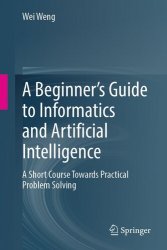 Название
Название: A Beginner's Guide to Informatics and Artificial Intelligence: A Short Course Towards Practical Problem Solving
Автор: Wei Weng
Издательство: Springer
Год: 2024
Страниц: 136
Язык: английский
Формат: pdf (true), epub
Размер: 18.7 MB
Embark on a transformative learning journey with this book, a concise and engaging short course for those taking their first steps into the realms of information science and Artificial Intelligence (AI). In today’s technology-driven world, Computer Science, Artificial Intelligence, and Data Science have emerged as foundational pillars that shape our digital landscape. As these fields continue to evolve and weave themselves into every aspect of our life, it is becoming increasingly essential for individuals from all walks of life to gain a solid understanding of their fundamentals.
The purpose of this book is to unlock the seemingly mysterious domains of Computer Science, AI, and Data Science, particularly for those who are taking their first steps into this realm. While these domains might appear intimidating at first glance, they possess an inherent beauty and logic that can be understood by anyone with the right guidance.
We created this book to enable swift transformation from a novice to a problem solver by providing a seamless learning experience from introducing basic concepts to engaging learners in practical problem-solving exercises. This carefully selected and designed course spanning seven to nine classes ensures that busy individuals can grasp the essentials swiftly and efficiently. This book covers a wide range of topics including computer, flowchart, time complexity, mathematical modeling, genetic algorithm, Machine Learning, network, database, and information security. Ideal for undergraduates, graduates, and professionals, this book lays a sturdy foundation upon which readers can build whether their aim is to undertake research projects, pursue a career in technology, or simply understand the workings of the digital age.
Machine Learning is a subfield of AI that seeks to replicate the learning capabilities of humans on computers. It has extensive applications in tasks such as object recognition, which involves recognizing and understanding input data to achieve intelligent processing. Some notable applications of machine learning include speech recognition, character recognition, image recognition, anomaly detection, medical diagnosis, financial market prediction, and obstacle sensing in self-driving technology. Machine Learning can be broadly categorized into two main types: supervised learning and unsupervised learning.
The learning objectives are:
- Foundational understanding: Build a sturdy foundation by introducing basic concepts and gradually progressing to advanced topics.
- Practical problem-solving: Foster the ability to solve real-world problems through guided exercises and application-oriented learning.
- Holistic knowledge: Provide a holistic understanding of information science and AI, empowering learners to contribute meaningfully to the future of these disciplines.
The key features are:
- Comprehensive coverage: Explore computer science basics to advanced AI techniques for a holistic understanding of the field.
- Engaging writing style: Complex concepts made approachable for beginners without sacrificing depth.- Bridging theory with application: Real-world scenarios illustrate and encourage practical applications.
- Practical exercises: Guided hands-on exercises develop problem-solving skills, ensuring a practical understanding of the material.
Contents:
1. Computer
2. Flowchart
3. Time Complexity
4. Artificial Intelligence—Mathematical Modeling
5. Artificial Intelligence—Genetic Algorithm
6. Artificial Intelligence—Machine Learning
7. Network
8. Database
9. Information Security
10. Solutions to Exercises
Скачать A Beginner's Guide to Informatics and Artificial Intelligence
[related-news]
[/related-news]